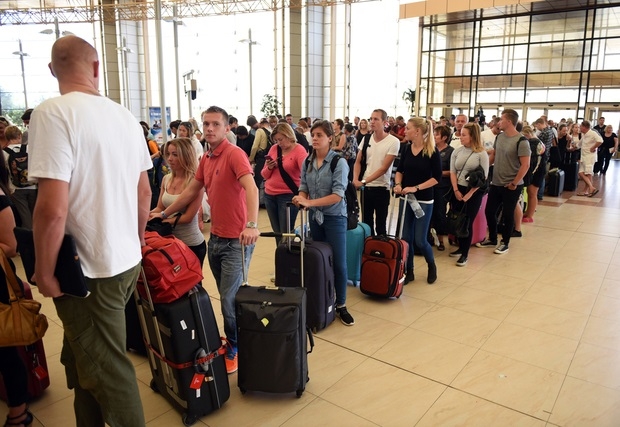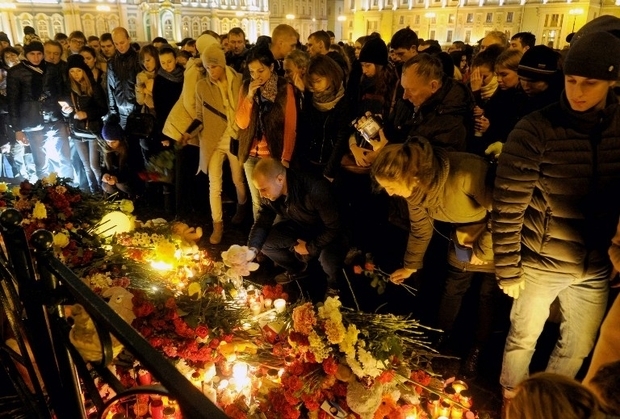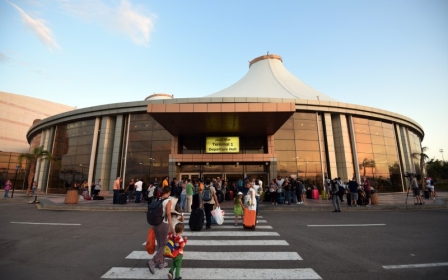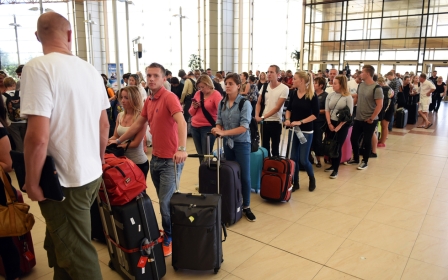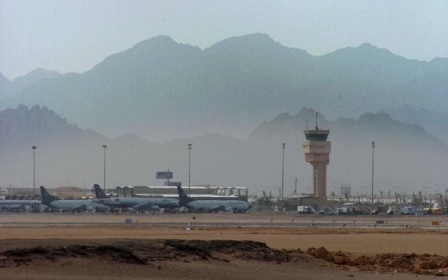Sharm el-Sheikh: A blow to the tourism sector
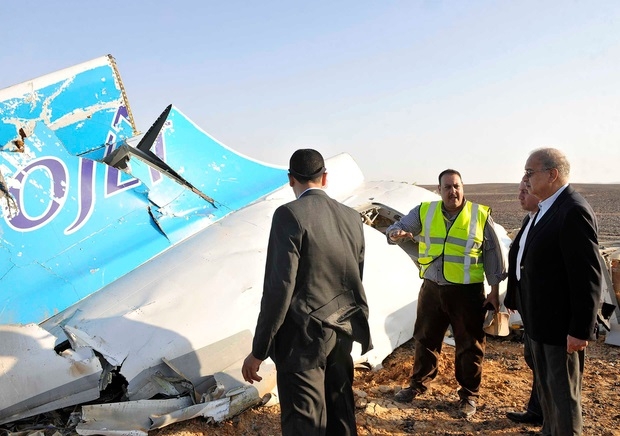
SHARM EL SHEIKH, Egypt – Located in the middle of a desert, Sharm el-Sheikh Airport resembles a big shell. In the main hall, the early dawn light is reflected on the white counters that will soon have to deal with the deluge of stranded tourists - all uncertain as to when they will depart.
In the cafeteria, an employee presses the fruit juice and showcases a few sandwiches. It is not yet eight o'clock, but Milena has ordered a vegetable salad and a coffee. The 27-year-old Russian lugs around a small light blue suitcase. It is a painful departure for her, as she did not want to leave Egypt.
“I have been here for two months. I was hired by a tourist agency for Russians. I had the choice to stay - I'm not seen as a real tourist - but my company told me it was not worth it as we would not have any work for several months," she told Middle East Eye.
Like thousands of tourists trying to head home after the crash of the Russian company Metrojet’s airliner that departed from Sharm el-Sheikh on 31 October, she knows it is not guaranteed that she can board a plane. "With this accident, tourism may collapse and I cannot afford to stay unemployed, I am going back to Russia without knowing what to do, I have no savings and no work there," she added.
The first flights are displayed on screens. Today there are about a dozen flights to Moscow-Domodevo, Moscow Sheremekyevo (Russia), Amman (Jordan), but also Cairo. Several flights to the United Kingdom should also depart during the day, despite diplomatic friction between London and Cairo over David Cameron’s unilateral decision to suspend civilian flights and evacuate British nationals, suspecting a terrorist attack, and Egypt’s decision to allow only a limited number of aircraft to land on the resort’s tarmac.
“We were asked to come four hours before our plane’s departure,” said Martin, a UK tourist accompanied by his wife Erin. “We hope to return but I have some doubts with all these Russians."
Since Russia and the UK announced the evacuation of their nationals, the atmosphere in the airport swings between moments of restlessness in the departure zone, and eerie quiet in the arrival zone. Within a few days, 30,000 Russians and 7,500 Britons headed home. But there were no new arrivals to replace them.
“It is sad… It’s such a nice city, people are friendly,” said Erin. “We came following friends’ advice and we loved our stay. I will advise my close friends to visit, especially with what’s happening now. Egyptians need our support.”
Another lost season
In the heart of Sharm el-Sheikh, a few stalls selling cigarettes and drinks are now opening. Without their tiny lights and music, the outdoor restaurants that remain closed seem lifeless. Small souvenir shops will open later too. “It is not yet the time, everyone is at the beach!” said Arthur, standing at his excursions stall where large, poor-quality posters are on display, advertising scuba diving and a camel trekking tour in the desert.
In his thirties, Arthur, an Armenian national raised in Ukraine, has been running the shop for seven years on behalf of an Egyptian. “I was easily hired, Russian is my native language,” he said. It is almost one o’clock, but nothing has been sold since this morning. “I am at five percent of my usual gains. It is past midday and no one has set foot in the store. I’m optimistic but it has been like that for days now, so if I have a client or two today, I’ll be happy.”
And what if nobody comes in? “Frankly, Sharm without the Russians is boring… They constitute 70 percent of our business! Usually seven employees work here. We have been only two for a week. There is nothing to do.”
For 12 hours a day, “sometimes more, sometimes less, depending on the work,” Arthur earns a fixed salary of 2,000 Egyptian pounds, slightly more than the average wage in Egypt (1,500 Egyptian pounds). “But I live in a tourist area where everything is much more expensive,” he explained. “My salary will run out right here, for sure. And if there was no more business, will my boss be able to pay my minimum wage? I am not even sure,” he said. “It happened in the middle of November, the peak season. We usually wait for it the whole year long, like crazy, we get ready and one week later, everybody is leaving…”
Soon, the financial concerns are overcome by anger. “I am resigned, all of this is political. And when it comes to politics, they can do whatever they want, we have no control over our own lives. The disappearance of tourists is not linked to the crash. That is nonsense; we are not in war time [...] I do not know what happened on that plane. I have the impression that I am being manipulated, so I prefer not to think about it,” he said. “I think the West wants to force Egypt to do things the way it [the West] wants it, this accident is the perfect opportunity to increase economic pressure, that’s all.”
The word “conspiracy” is uttered. It’s a sentiment shared by Egyptians like Ahmed, who has lived in Sharm el-Sheikh for 27 years. Ahmed has worked as both a diving instructor and a waiter at the resort, and in recent years, he has been working as a taxi driver. “They want to kill us, I see no other explanation. Here there are only Russian and English tourists, and they are the ones being evacuated!” he said.
Ahmed increased his taxi fare more than the average because “one must live”. He parks his car in front of the Maritim Jolie Ville, hoping for fares. In this five-star hotel, the large pool is not very busy. A couple sunbathe on a row of deserted chairs, while the Snoopy Kids Club is strangely silent. The hotel has more than a hundred rooms spread in small bungalows overlooking some green spots. Most of the action takes place on a little private beach, where 30 tourists sunbathe facing the sea, with the latest trendy music hit as background noise.
At the reception, our questions are politely declined: “We were instructed not to talk to the press,” said one of the managers.
Hotels are silent on the issue. The topic is sensitive because Sharm el-Sheikh has experienced similar tragedies in its past. In 2004, an aircraft of the Egyptian company Flash Airlines crashed into the Red Sea minutes after takeoff - a pilot error that caused 135 deaths. The following summer, a suicide bomber blew himself up in the Ghazala Gardens hotel. Six other explosions occurred at the same time on the market and several hotel complexes, killing 88 people and wounding more than 200. In 2006, it was the city of Dahab, located 90km from Sharm, that was hit by a triple suicide bombing. Eighteen people were killed.
In the following four years, the region, brutally abandoned by tourists, slowly recovered. But on the beaches that were filling up again, serial shark attacks killed and injured several foreigners. The following year, in 2011, the revolution broke out, thus emptying the resort.
“Every time we stand on our feet, we get slapped again,” said Arthur. In recent years, Egypt has lost over 35 percent of its attendance, and tourism, formerly touted as the main source of the country’s income, now only brings in 11 percent of GDP. The sector owes its survival to the Russian and British tourists who visit in search of sun and sea at low cost.
Indeed, in downtown Sharm, a few mini-shorts walk alongside full black veils, but tourists from the Gulf countries account for only 10 or 20 percent of attendance at resorts, according to Mohamed, head of a souvenir shop. “It is not thanks to them [the Gulf tourists] that we will survive. Sharm is not adapted to this type of tourists,” he explained.
Ayma Eylkassouni, the Marriott hotel manager, remained cautious: “It is hard to say what will happen in the coming weeks, but we are worried. We are obviously very saddened by this accident, but we have our eyes on the bookings. It is too early to measure the impact [...]. A significant drop is expected in the coming weeks but I do not want to speak of a crisis, it is not one - at least - not yet.”
For the boss of Tropitel, located in the Namaa Bay city centre, the situation is already measurable. “We are losing an incredible number of customers, people are leaving and we had no arrivals for over a week,” he said anxiously. “All bookings have been cancelled, it is very worrying, and we are supposed to be in peak season. It was 60 percent full before the crash, but a fall below 35 percent is expected at the end of the week. It is hard to be optimistic; I think we will have nobody before the Egyptian authorities agree to reveal the results of the investigation.”
For him, the decisions made by Russia and Britain are unfair towards the Egyptian people, but whatever the reason lying behind the accident, vacationers’ safety should be non-negotiable. “It is essential, it must be strengthened, and not only in Egypt. But it is an illusion to believe that it protects us from terrorism, because no place can be 100 percent secure wherever that place is.”
Keeping the illusion
In response to this catastrophe hitting the tourism sector and to the dismay of residents, the Egyptian authorities - who were deemed incompetent in addressing the crisis - made only one comment to MEE: “The Minister [of Tourism] Hisham Zaazou expressed his confidence in the recovery of the tourism industry in Egypt,” said Rasha Azaizi, the Minister’s spokesperson. "Besides, Hurghada and Marsa Alam resorts are operational. The Nile cruises operate, and Sharm el-Sheikh and around stations are always ready for business.”
As night falls on Sharm el-Sheikh, Mohamed’s store is still open - his goods of shiny pyramids and plates piled high on shelves. Mohamed is sitting cross-legged in the middle of his shop, watching television. “How's business? Nothing… nothing since this morning,” he whispered. “100 guineh [Egyptian pounds], that’s all.”
“I have never experienced such an event, I try to reassure myself, but I don’t know what will happen,” he said, bewildered.
In a small deserted street, the shops are removing djellabas from hangers and putting away miniature leather camels earlier than usual. “We have seen nobody for the past two days,” said Mohamed. “Last week, I was making 1,000 to 1,500 guineh per day. Now nothing, all the Russians are leaving, what do we have? [...] I pay 10,000 guineh a month for rent and I have an employee,” he said, pointing in the direction of a young boy wearing a Bedouin galabeya.
"I can take a fortnight, perhaps a month maximum, but what will I do? I don’t have a job elsewhere, I can’t do anything else. On TV, they say tourists will come back; they will be here in a few weeks, but what I see is that everybody is leaving, and nobody is coming. Within a week, Sharm el-Sheikh will be empty. Look, there is nobody on the terraces. All this music in cafes, look, it is crap, just an illusion."
In a shisha bar with soft cushions, waiters perform a choreography learned for the new season. They fail to encourage a couple and a small group of Egyptians to join them. Tatiana, sitting at a terrace with friends, smokes a waterpipe with melon. This young Russian heard of the airplane story, but for her, there is no way she would cut short her vacation. “We are here no? The people are nice, and there is room in every restaurant,” she exclaimed.
New MEE newsletter: Jerusalem Dispatch
Sign up to get the latest insights and analysis on Israel-Palestine, alongside Turkey Unpacked and other MEE newsletters
Middle East Eye delivers independent and unrivalled coverage and analysis of the Middle East, North Africa and beyond. To learn more about republishing this content and the associated fees, please fill out this form. More about MEE can be found here.


